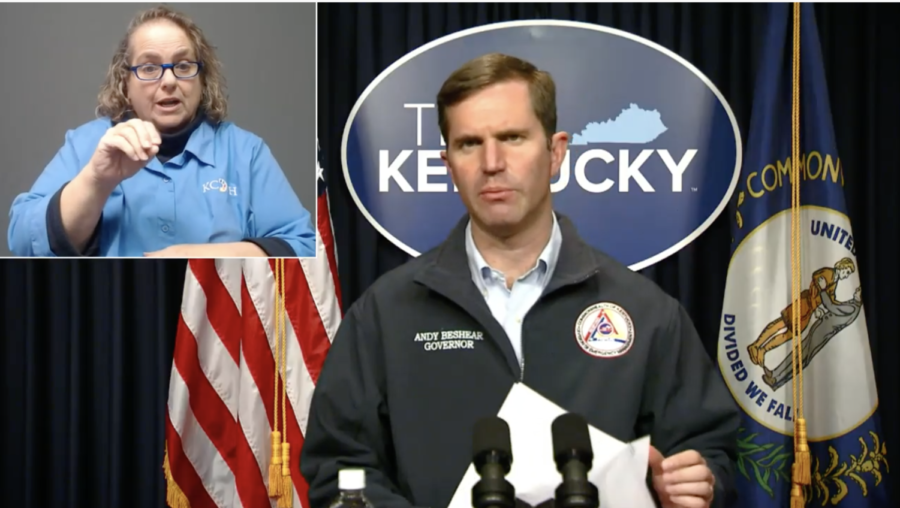3,000 deaths, ramping up vaccine rollout: updates from Beshear for Jan. 14
January 14, 2021
Kentucky has crossed another somber milestone – over 3,000 deaths from COVID-19 have been reported in the Commonwealth, as the state marks 10 months of the pandemic.
Kentucky Gov. Andy Beshear announced 51 new deaths during his press conference on Jan. 14, bringing the total number to 3,042.
3,000 deaths is a solemn number, particularly in light of the time it took to reach that milestone. Kentucky hit 1,000 deaths from coronavirus in September, seven months after the start of the pandemic – and it only took another three months to record the additional 2,000 deaths that make up today’s report.
Beshear reported 4,084 new cases for Jan. 14, which is down from the last two Thursday reports. He said is concerned about hospital capacity in some regions, but that Kentucky is not at the levels of LA county.
“But with numbers this high, that can change and change quickly,” Beshear said.
Beshear emphasized businesses should enforce the mask rule because the “likelihood is higher than it has ever been” that someone in the business is spreading COVID-19.
Hope is on the horizon, though; Beshear announced two positive developments in vaccination efforts.
First, the timeline to vaccinate educators has been moved up. Kentucky previously thought they would begin vaccinating teachers the week of Feb. 1 – now, Beshear says they plan to have all K – 12 employees receive their first dose by the end of that week.
“Our educators are going to have real and significant defense against this virus for their own health,” Beshear said, adding that this is an important step for reopening schools.
Beshear also announced an initiative to make vaccine distribution more equitable and widen rollout to more demographics.
Kentucky will partner with Kroger to set up regional vaccination hubs, which will be high volume, drive-thru facilities.
Beshear called back to when Kentucky was struggling to get enough testing volume and how Kroger changed the game.
The hubs will open the week of Feb. 1 and provide vaccinations to everyone in the first phase, all the way down to 1C.
That includes everyone over the age of 60, everyone with underlying health conditions and all essential workers.
Kentucky’s definition of essential workers comes from the CDC, and includes:
•Healthcare Personnel
•First Responders (Firefighters, Police)
•Corrections
•Education (teachers, support staff, daycare)
•Food & Agriculture
•Manufacturing
•U.S. Postal service workers
•Public transit workers
•Grocery store workers
Other Essential Workers
•Transportation and logistics
•Food Service Shelter & Housing
(construction)
•Finance
•IT & Communication
•Energy
•Media
•Legal
•Public Safety (Engineers)
•Water & Wastewater
Jim Gray, former mayor of Lexington, will direct this initiative.
“This is all about team Kentucky delivering on an ambitious, life-saving project,” Gray said. He will coordinate with the Department of Emergency Management and other partners.
Dr. Steven Stack will continue to oversee the procurement and allocation of doses
There is not yet a firm number of hubs planned, though Beshear said there will be a sufficient number so that everyone in Kentucky can drive a “reasonable distance” to get their vaccination.
Gray said the number of hubs will increase over time, and that they are currently identifying and securing sites. According to Gray, Kroger is also working on a hotline and website to ease sign-ups and notifications for people wondering when they can get their vaccine.
Gray said they will announce the locations and more details on Jan. 28.
“This is going to take some time and our system relies on the speed of the vaccine manufacturers and releases from the federal government, so we continue to ask for your patience,” Gray said.
Beshear said the pace of vaccination is “really picking up” in Kentucky. The state has so far administered 143,560 doses; another 98,475 doses have been delivered to long-term care residents through the federal partnership with CVS and Walgreens.
Dr. Stack noted that demand and availability of vaccinations differs across communities, as some places have more healthcare workers than others.
Beshear spoke about the vaccine process of the state, noting that local health departments do not know how many vaccines they will get until Friday and that the allocation from the federal government may not be the same week to week.
He said he hopes the allocation gets more uniform and that manufacturing pace increases in the future, so Kentucky can plan distribution easier.
































































































































































